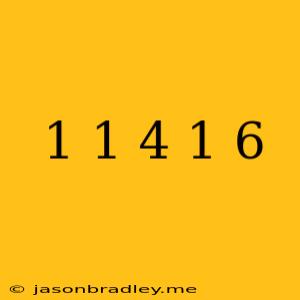Subtracting Fractions: 1 1/4 - 1/6
This article will guide you through the process of subtracting the fractions 1 1/4 and 1/6.
Understanding Mixed Numbers
Before we begin, let's clarify what a mixed number is. A mixed number combines a whole number and a fraction, such as 1 1/4. This represents one whole unit plus one-quarter of another unit.
Finding a Common Denominator
To subtract fractions, they must share the same denominator. The least common denominator of 4 and 6 is 12.
- Convert 1 1/4 to an improper fraction: Multiply the whole number (1) by the denominator (4) and add the numerator (1): 1 x 4 + 1 = 5. Keep the same denominator: 5/4.
- Convert 5/4 to an equivalent fraction with a denominator of 12: Multiply both the numerator and denominator by 3: (5 x 3) / (4 x 3) = 15/12.
- Convert 1/6 to an equivalent fraction with a denominator of 12: Multiply both the numerator and denominator by 2: (1 x 2) / (6 x 2) = 2/12.
Subtracting the Fractions
Now that both fractions have the same denominator, we can subtract them:
15/12 - 2/12 = 13/12
Simplifying the Answer
The result, 13/12, is an improper fraction (the numerator is larger than the denominator). We can simplify this into a mixed number:
- Divide the numerator (13) by the denominator (12): 13 ÷ 12 = 1 with a remainder of 1.
- The whole number is 1, and the remainder (1) becomes the numerator of the fraction. The denominator stays the same (12): 1 1/12.
Conclusion
Therefore, 1 1/4 - 1/6 is equal to 1 1/12.
